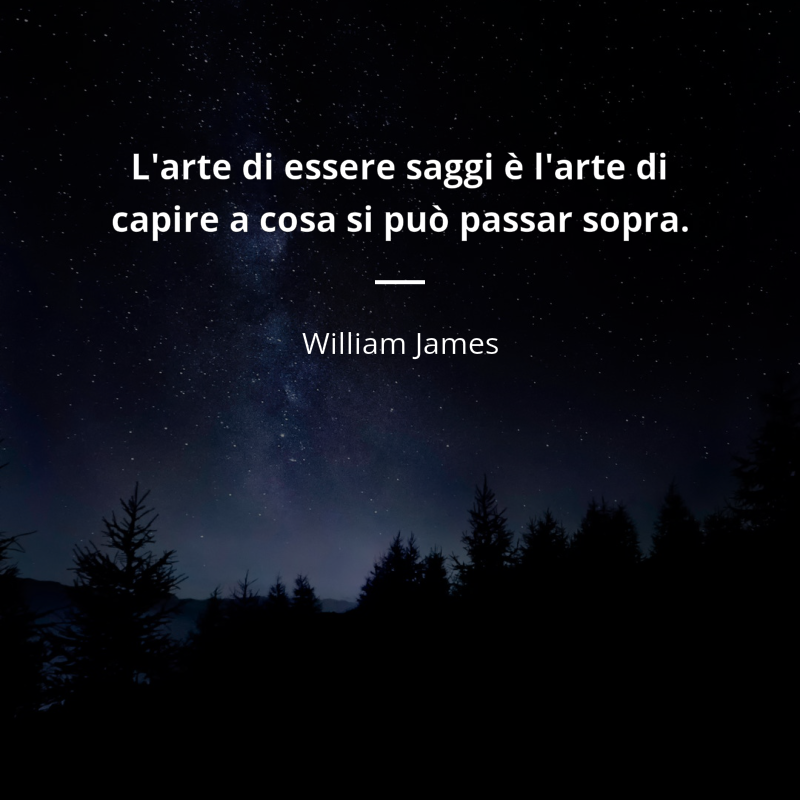William James frasi celebri
“L'essere umano più miserabile del mondo è quello in cui la sola cosa abituale è l'indecisione.”
Origine: Citato in Guido Almansi, Il filosofo portatile, TEA, Milano, 1991.
Principi di psicologia

Principi di psicologia
Origine: Da Esiste la coscienza?, in Saggi sull'empirismo radicale, Laterza, 1971, pag. 34.
Frasi sulla vita di William James
Origine: Da Varie forme dell'esperienza religiosa; citato in Serena Zoli, Giovanni B. Cassano, E liberaci dal male oscuro, TEA, Milano, 2009, p. 482. ISBN 978-88-502-0209-6
“Sforzati di credere che la vita è degna di essere vissuta e questo ti aiuterà a renderla tale.”
Origine: Citato in Julia Butterfly Hill, Ognuno può fare la differenza, traduzione di Isabella Bolech, Corbaccio, Milano, 2002, p. 16. ISBN 88-7972-542-4
“La religione […] è la reazione totale di un uomo alla vita.”
Origine: Da Le varie forme dell'esperienza religiosa.
William James: Frasi in inglese
Lecture I, The Present Dilemma in Philosophy
1900s, Pragmatism: A New Name for Some Old Ways of Thinking (1907)
Lecture II, What Pragmatism Means
1900s, Pragmatism: A New Name for Some Old Ways of Thinking (1907)
"The Will to Believe" p. 14 http://books.google.com/books?id=Moqh7ktHaJEC&pg=PA14
1890s, The Will to Believe and Other Essays in Popular Philosophy (1897)
"Is Life Worth Living?"
1890s, The Will to Believe and Other Essays in Popular Philosophy (1897)
Lectures XIV and XV, "The Value of Saintliness"
1900s, The Varieties of Religious Experience (1902)
The Dilemma of Determinism (1884) republished in The Will to Believe, Dover, 1956, p. 149
1880s
Lectures IV and V, "The Religion of Healthy-Mindedness"
1900s, The Varieties of Religious Experience (1902)
"What Makes a Life Significant?"
1910s, Talks to Teachers on Psychology and to Students on Some of Life's Ideals (1911)
Lecture XX, "Conclusions"
1900s, The Varieties of Religious Experience (1902)
Lecture IX, "Conversion"
1900s, The Varieties of Religious Experience (1902)
Lecture I, "Religion and Neurology"
1900s, The Varieties of Religious Experience (1902)
Robert Gould Shaw: Oration upon the Unveiling of the Shaw Monument http://www.holycross.edu/departments/english/sluria/wjspeech.htm (31 May 1897)
1910s, Memories and Studies (1911)
Letter to Henry James (ca. 1890) as quoted by Robert D. Richardson, William James: In the Maelstrom of American Modernism (2007) p. 297. Also as quoted partially by Alfred North Whitehead, Science and the Modern World (1925) p. 2.
1890s
Chapter XI: Attention http://books.google.com/books?id=U6ETAAAAYAAJ&q=%22It+is+an+odd+circumstance+that+neither+the+old+nor+the+new+by+itself+is+interesting+the+absolutely+old+is+insipid+the+absolutely+new+makes+no+appeal+at+all+The+old+in+the+new+is+what+claims+the+attention+the+old+with+a+slightly+new+turn%22&pg=PA108#v=onepage
1910s, Talks to Teachers on Psychology and to Students on Some of Life's Ideals (1911)
“There is no more miserable human being than one in whom nothing is habitual but indecision.”
Origine: 1890s, The Principles of Psychology (1890), Ch. 4
“Every way of classifying a thing is but a way of handling it for some particular purpose.”
1880s, The Sentiment of Rationality (1882)
“There is no worse lie than a truth misunderstood by those who hear it.”
Lectures XIV and XV, "The Value of Saintliness"
1900s, The Varieties of Religious Experience (1902)
Lecture III, "The Reality of the Unseen"
1900s, The Varieties of Religious Experience (1902)
Robert Gould Shaw: Oration upon the Unveiling of the Shaw Monument
1910s, Memories and Studies (1911)
Origine: 1890s, The Principles of Psychology (1890), Ch. 25
“My thinking is first and last and always for the sake of my doing.”
Sometimes paraphrased as "Thinking is for doing", perhaps originally by S.T. Fiske (1992)
Origine: 1890s, The Principles of Psychology (1890), Ch. 22
“An act has no ethical quality whatever unless it be chosen out of several all equally possible.”
Origine: 1890s, The Principles of Psychology (1890), Ch. 9
“Democracy is still upon its trial. The civic genius of our people is its only bulwark.”
Robert Gould Shaw: Oration upon the Unveiling of the Shaw Monument
1910s, Memories and Studies (1911)
Origine: 1890s, The Principles of Psychology (1890), Ch. 5
To his young son from the Yosemite Valley on (28 August 1989)
1920s, The Letters of William James (1920)
Lectures XVI and XVII, "Mysticism"
1900s, The Varieties of Religious Experience (1902)
“A purely disembodied human emotion is a nonentity.”
Origine: 1890s, The Principles of Psychology (1890), Ch. 25
"Confidences of a 'Psychical Researcher'" http://hcl.harvard.edu/libraries/houghton/exhibits/james/psychical/7_8.cfm, in The American Magazine, Vol. 68 (1909), p. 589
Often (mis)quoted as: "We are like islands in the sea; separate on the surface but connected in the deep", or: "Our lives are like islands in the sea, or like trees in the forest, which co-mingle their roots in the darkness underground."
1900s
"The Importance of Individuals"
1890s, The Will to Believe and Other Essays in Popular Philosophy (1897)
“A paradise of inward tranquility seems to be faith's usual result.”
Lectures XI, XII, and XIII, "Saintliness"
1900s, The Varieties of Religious Experience (1902)
